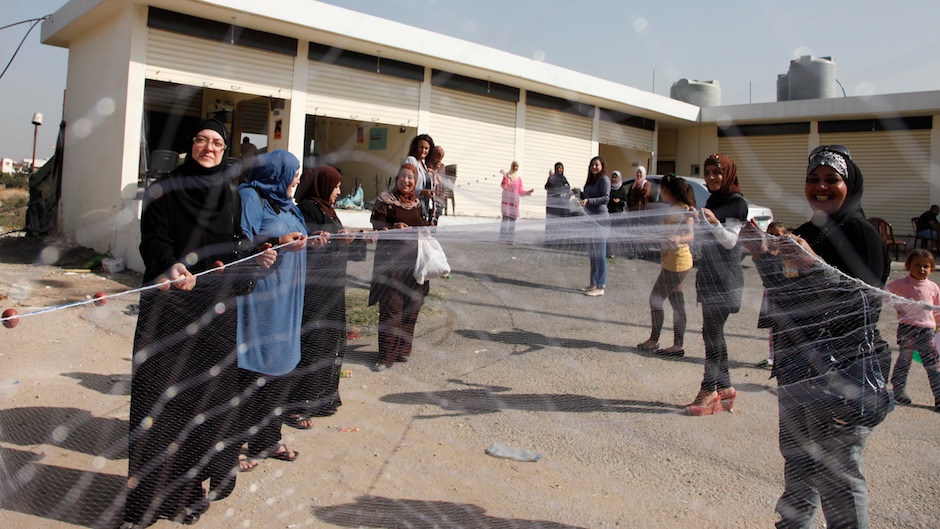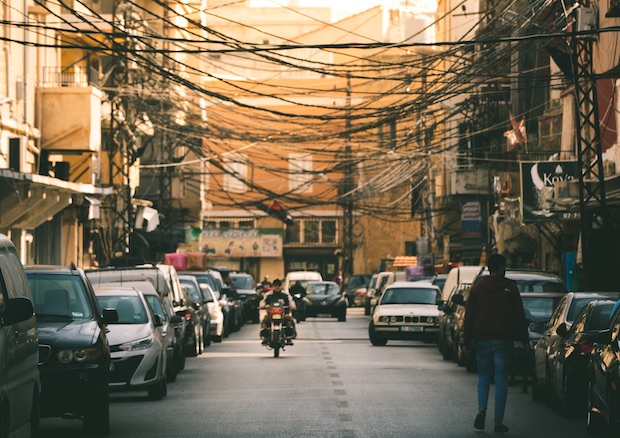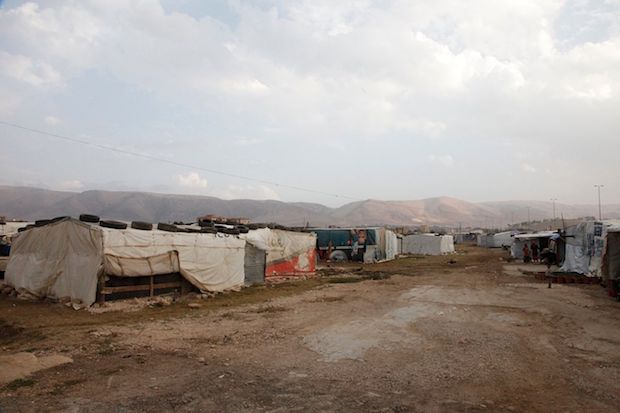Evangelical churches acknowledge the serious refugee crisis but “continue to selflessly and tirelessly respond to the overwhelming needs around them”.
 A group of Syrian refugee women in Lebanon, showing a home-made net. / UK DFID, Wikimedia Commons.
A group of Syrian refugee women in Lebanon, showing a home-made net. / UK DFID, Wikimedia Commons.
The Lebanese authorities have stated that the country no longer has the resources to continue hosting the around 1.5 million Syrians on its territory, and they call on the UN to take responsibility.
“Lebanon is no longer able to play policeman for other countries, because we do not receive any help whatsoever in this regard. The country is alone in this and we bear all the burden”, said Labour Minister Mustafa Bayram.
Lebanon is in the midst of a severe economic, social and political crisis. The explosion of the warehouse in the port of Beirut two years ago, the Covid-19 pandemic and a new period of political instability, with large demonstrations and clashes between political and religious groups, have aggravated the situation in the country.
A World Bank report describes the situation in Lebanon as “possibly one of the top three most severe crisis episodes globally since the mid-19th century”.
Furthermore, the first legislative elections since the explosion in Beirut, have led to a loss of Hezbollah's influence and the entry of new parties, further fragmenting the parliament.
Christian organisations, such as Merath, recognise the seriousness of the situation in Lebanon and do not diminish its importance.
“The economic and social crises in Lebanon have been spiralling out of control”, says the organisation's communications director, Sophie Nasrallah.
According to Nasrallah, inflation (which reached 400% months ago), the devaluation of the Lebanese pound and shortages of gasoline and other basic goods “is affecting everyone, including already vulnerable Syrian refugees, over 90% of whom are now living in extreme poverty, and migrant workers, who are stuck in Lebanon without rights or resources”.
But,“it also affects more and more Lebanese families, with more than 80% of the Lebanese population now living in poverty”, she adds.
However, “in the run up to this year’s legislative elections, bringing up the refugee situation is a way to shift the blame of the current situation and to distract the people’s attention”, stresses Nasrallah.
Wissam Nasrallah, head of operations of the Christian Lebanese Society for Education and Social Development (LSESD), agrees that the Lebanese government's complaints are “a way for the Lebanese government to turn on the pressure on the International Monetary Fund by waving the spectre of social unrest”.
Moreover, “the war in Ukraine is also exacerbating the challenges faced in Lebanon since around 90% of Lebanon's wheat is imported from either Ukraine and Russia, leading to skyrocketing prices and major shortages”.

For Wissam Nasrallah, it is impossible to deny that the reception of refugees “has put significant strain on an already struggling national infrastructure".
The situation has also led to an increase of insecurity in the territory. “Crime rate is on the rise. Almost every other week we hear about people being kidnapped and their kidnappers asked for ransoms to free them”, explains Izdihar Isaac, head of 'Together for the family', a refugee project in Lebanon supported by Alianza Solidaria in Spain.
While remaining realistic about the situation in the country, the Christian organisations call for continuing to serve those who are most in need and who come to Lebanon seeking temporary refuge.
“The best thing the UN and Western countries can do is to be intentional to facilitate the return of the Syrian refugees to Syria and to continue to help them rebuilding their lives there. This will elevate a huge burden on the Lebanese economy”, underlines Isaac.
However, “there seems to be several political reasons that prevent this approach to take place. God calls all of us to be agent of love and express such love in offering any possible humanitarian, educational and vocational help to the refugees”, she adds.
Wissam Nasrallah points out that there has been “a drastic shift in local Christian's perspectives over the past few years. At first, most Christians were adamantly opposed to assisting refugees. Like other Lebanese, they recognized the negative impact that such a large immigration of people would have on their own lives and well-being”.
“To be fair, many Lebanese Christians were also deeply scarred and traumatized from when Syrian forces occupied our country during the Lebanese Civil War (1975-1990). Many saw family members murder or kidnapped at the hands of Syrian forces. So for many, there is still deep personal pain that has been brought to the surface with the arrival of Syrian refugees”.
Despite all this, “we have seen God move in extraordinary ways. By His Spirit alone we have seen Him work through Christians to live out the very real and difficult command to love thy enemy. Some churches that began as outright resistant or neutral to aiding refugees now have thriving ministries that are helping thousands of refugees each week”, says the head of LSESD.
Sophie Nasrallah explains that in Merath they “work with over 20 evangelical churches in Lebanon. Since the beginning of the refugee crisis, they have felt the desire to reach out to the refugee community and help the vulnerable families. We have helped them do just that for the past 11 years. Today, despite being affected by the crisis, these churches have continued to selflessly and tirelessly respond to the overwhelming needs around them”.
The communications director of Merath explains that “they do not get into politics. They see people with dignity, regardless of their nationality or religious background, as human beings created in God’s image”.
“Thanks to faithful partners everywhere in the world, they are able to help thousands of families each year, most of them refugees, with food assistance, hygiene kits, winter items, milk and diapers, education for out-of-school children, income-generating opportunities and shelter rehabilitation”, she adds.
For those families, “it is much more than material assistance. It is a reminder that God has not abandoned them, that He cares about them, and will take care of them. And it opens the door for a holistic and authentic Christian testimony”.

[photo_footer]Image of an informal refugee camp in the Bekaa Valley / Russell Watkins, DFID, Wikimedia Commons..[/photo_footer]
In light of the EU's swift response in hosting refugees from the conflict in Ukraine, questions must be asked about the stagnation experienced by hundreds of thousands of Syrians in Lebanon for years.
According to UNHCR, only 6,341 resettlement applications have been processed so far this year, compared to 25,706 in 2021 and 76,943 in 2016.
“In our region, we know too well what it is to experience war and care for refugees and internally displaced people, and our hearts break for the people of Ukraine. We are happy for them, that they at least get to experience such solidarity and hospitality. We understand, from a human perspective, that Europeans naturally feel closer to Ukrainians because they look like them”, underlines Sophie Nasrallah.
But she also adds that “as Christians though, we are meant to love our neighbors as ourselves, no matter how different these neighbors look. That is the whole point of the story of the Good Samaritan. Everyone is our neighbor on this earth, and we have to be a good neighbor to all”.
For Wissam Nasrallah, it is more a question of “cultural affinity”, but he stresses that “as the church we should not discriminate, especially when it comes to helping those in need. We are reminded of this fact in Leviticus 19:33-34: When a foreigner resides among you in your land, do not mistreat them. The foreigner residing among you must be treated as your native-born. Love them as yourself, for you were foreigners in Egypt. I am the Lord your God”.
Although, like Sophie Nasrallah, he is “so glad that Europe and other Western countries showed solidarity with the crisis in Ukraine”, Isaac sometimes feels that “there is a kind of double standards in viewing suffering countries and treating other refugees. We think of Yemen, Myanmar, Ethiopia and we do remember the horrible war on Iraq, Libya and Afghanistan and we do feel kind of impartiality”.
He thanks “many people and churches in Europe who did not forget the refugees’ crises in other countries and who have been faithful in their prayers and financial support throughout the years”.
But at the same time, ”we do hope that churches in Europe will continue to see other Christians in other countries as the One Body of Christ and to extend love and passion to every human being regardless of gender, race or religion”.
Sophie Nasrallah asks the church in Europe “not to forget about our part of the world, because the humanitarian needs have never been higher, and because the Ukrainian crisis will have far-reaching and long-lasting repercussions on us too”.
“Keep on praying for us and supporting us financially, so that our partner churches on the ground do not have to abandon the families they have been helping and have built strong relationships with”, the Merath communications director concludes.
[donate]

Las opiniones vertidas por nuestros colaboradores se realizan a nivel personal, pudiendo coincidir o no con la postura de la dirección de Protestante Digital.
Si quieres comentar o